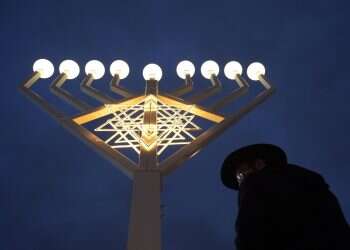A very significant portion of my life has been devoted to personally combating Russian anti-Semitism. I experienced firsthand the extent of hatred against Jews that was ingrained in most Soviet leaders and bureaucrats. I will never forget the day when a leading KGB officer proudly told me it would be the happiest day in his life to see Jews being strung up from the lamp posts in Moscow's streets.
Russian anti-Semitism dates back centuries. It was encouraged by the Russian Orthodox Church and the czars perpetrated pogroms to divert attention from social issues. While the Communists initially condemned anti-Semitism, in practice they maintained it as a state policy.
Given all I have witnessed and battled against during the campaign to free Soviet Jewry, it would be bizarre for anyone to accuse me of being soft on Russian anti-Semitism.
But I believe the hysterical attacks on Russian President Vladimir Putin following his recent misplaced comments about interference in the U.S. elections are outrageous and could lead to dire consequences.
In a rambling interview with NBC's Megyn Kelly, who was pressing him to respond to allegations of Russian interference in the U.S. elections, Putin facetiously referred to the possibility of Russian Jews being involved.
This was catapulted to front-page headlines, many of which accused Putin of outright anti-Semitism and of resurrecting Judeophobia, including the notorious "Protocols of the Elders of Zion." These hysterical denunciations were echoed by the Anti-Defamation League, which called on U.S. President Donald Trump to condemn Putin as an anti-Semite for attacking Jews and other minorities. Even the normally restrained American Jewish Committee joined in the fray. A Jerusalem Post editorial urged Prime Minister Benjamin Netanyahu to denounce Putin.
All these condemnations were based on taking Putin's comments out of context and totally distorting them.
What did he actually say? In the course of an interview insinuating that he had interfered in the U.S. elections, Putin, in exasperation, turned on the interviewer and in Russian snapped, "Maybe they are not even Russians. Maybe they were Ukrainians, Tatars, Jews, just with Russian citizenship. Even that needs to be checked. Maybe they had dual citizenship. Or maybe a green card. Maybe it was the Americans who paid them for this work. How do you know? I don't know."
Anyone with a semblance of intelligence would appreciate that this gibberish was simply a tactic to end the interview.
The Jews were mentioned in passing, as a Russian nationality. Had he mentioned Jews alone and sought to blame them, that would be another matter. But that was not the case.
I am not entering into the issue of whether Putin, a former KGB agent, interfered in the U.S. elections.
But he certainly did not engage in anti-Semitism. There is an element of madness in the air.
The indoctrinated hatred of Jews among Russians over the past centuries cannot disappear overnight, and plenty of anti-Semitic paranoia remains among the masses.
Even if one opposes Putin's autocratic behavior and foreign policy, he must be recognized as one of the most positive forces in Russia combating Jew-hatred and supporting the local Jewish community.
There are various explanations for Putin's apparent philo-Semitism. Some say he was influenced as a youngster in St. Petersburg, where he was looked after by a Jewish couple and deeply affected by a German-Jewish teacher, Mina Yuditskaya, who later moved to Israel. He met her on a visit to Israel in 2005 and purchased an apartment for her in Tel Aviv, where she lived until she passed away recently.
Putin has encouraged the Jewish renaissance in Russia, developed a warm relationship with Chabad Rabbi Berel Lazare, and has many Jewish friends. He has made a distinct effort to attend Jewish functions such as the opening of the Jewish Museum and Tolerance Center in Moscow, to which he contributed $50 million of state funds and even symbolically personally donated a month's salary. He attends Hanukkah celebrations and conveys goodwill for Rosh Hashanah, the Jewish new year – something utterly unprecedented from a Russian nationalist leader.
Despite his strategic involvement with the Syrians, Putin has determinedly kept the channels to Israel open. He has personally visited Israel on several occasions, making it the first country to visit after his election in 2012. He speaks warmly of the Jewish state, expressing pride that it contains the largest diaspora of Russian Jews. At the Western Wall, he donned a kippah – undoubtedly making his Bolshevik predecessors turn in their graves and enraging his Arab allies.
Putin holds regular meetings with Netanyahu, Defense Minister Avigdor Lieberman and other Jewish leaders, who all testify to his deep respect for Israel, especially its military and intelligence capabilities.
This is not to say that we should be party to idealistic delusions and could necessarily rely on Putin if he were forced to choose between supporting Israel and abandoning his control of Syria. For the time being, we will continue the balancing act and hope we can sustain the relationship.
But to accuse this man of anti-Semitism and link him with the dark forces of Russian Jew-baiting because of an ad lib comment taken out of context is utter madness. If such hysteria is not halted, it could inflict enormous harm on the Jewish people and Israel.
We have enough enemies and do not need to abuse those who display genuine friendship toward us.



